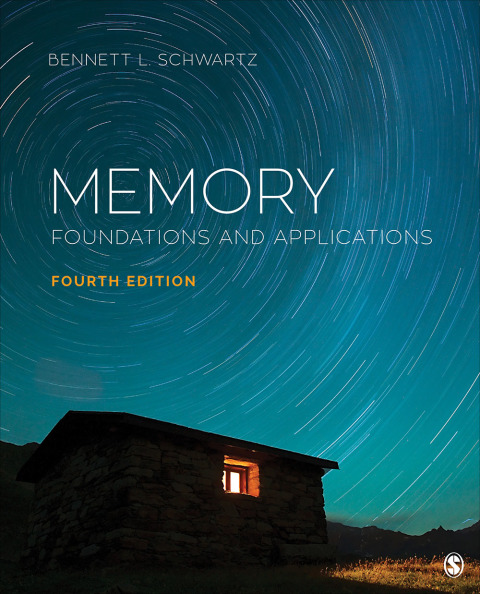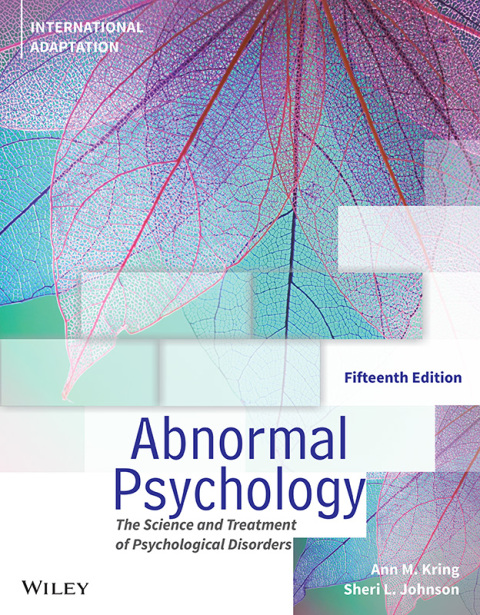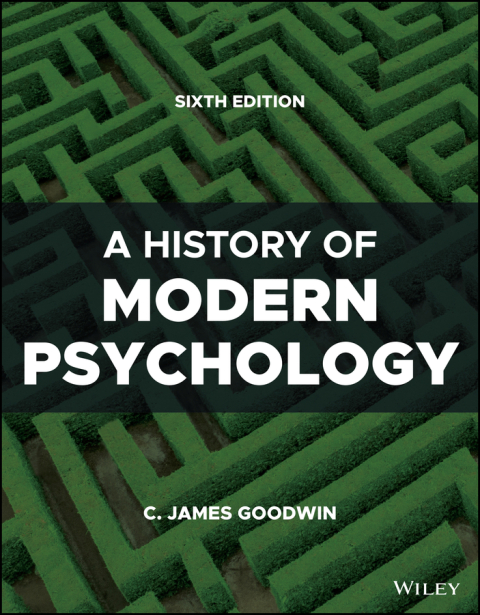Description
Efnisyfirlit
- Preface
- About the Author
- Section 1 • Memory and Processes of Memory
- Chapter 1 • Introduction to the Study of Memory
- The Science of Memory
- The History of Memory Research
- Hermann Ebbinghaus (1850–1909)
- Mary Calkins (1863–1930)
- Behaviorism
- Frederic Bartlett (1886–1969)
- Endel Tulving (1927–)
- Cognitive Psychology
- Elizabeth Loftus (1944–)
- Cognitive Neuroscience
- • Section Quiz
- Methods of Studying Memory
- Memory Measures
- Recall
- Recognition
- Implicit Memory Tests
- Reaction Time
- Source Judgments
- Metamemory Judgments
- Summary of Memory Measures
- Neuropsychology
- Animal Models
- Neuroimaging
- • Section Summary and Quiz
- Culture and Memory
- Improving Memory Efficiency
- Themes for the Book
- Summary
- Key Terms
- Review Questions
- Online Resources
- Chapter 2 • Neuroscience of Memory
- Old Questions, New Answers
- Brain and Memory
- The Neuron
- Neurotransmitters
- Structures of the Human Brain
- Subcortical Structures
- Cortical Areas of the Brain Associated With Memory
- Interim Summary and Quiz
- Methods of Cognitive Neuroscience
- EEG (Electroencephalography)
- Magnetoencephalography (MEG)
- Positron Emission Tomography (PET)
- Magnetic Resonance Imaging Technologies
- Brain Stimulation Techniques
- • Section Quiz
- Neuropsychology: Memory Deficits and Amnesia
- Chemical Enhancement of Memory
- Olfaction, Memory, and the Brain
- Genetic Approaches
- Case Example: The Neuroscience of Face Memory
- Summary
- Key Terms
- Review Questions
- Online Resources
- Chapter 3 • Working Memory
- What Is Working Memory?
- Some Terminological Clarifications
- Sensory Memory
- Working Memory Capacity
- Memory Span Tasks
- Pronunciation Time
- The Duration of Information in Working Memory
- The Serial Position Curve and Its Implication for Working Memory
- Section Summary and Quiz
- The Working Memory Model of Baddeley
- Working Memory Systems
- The Phonological Loop
- Visuospatial Sketchpad
- The Episodic Buffer
- The Central Executive
- Section Summary and Quiz
- Working Memory and the Brain
- Applications of Working Memory
- Reading Fluency
- Verbal Fluency
- Summary
- Key Terms
- Review Questions
- Online Resources
- Chapter 4 • Episodic Memory
- Evidence for the Episodic/Semantic Distinction
- Behavioral Evidence
- Neuropsychological Evidence
- Evidence From Neuroimaging
- • Section Summary and Quiz
- Memory Processes: Encoding, Representation, and Retrieval
- Encoding in Episodic Memory
- Levels of Processing
- Applications of Levels of Processing
- The Self-Reference Effect
- Survival Processing
- The Generation Effect
- Organization
- Distinctiveness
- Section Summary and Quiz
- Memory Processes: Encoding, Representation, and Retrieval
- Retrieval From Episodic Memory
- Encoding Specificity
- Inhibition in Episodic Memory
- Retrieval-Induced Inhibition
- Part-Set Cueing
- Directed Forgetting
- Summary
- Key Terms
- Review Questions
- Online Resources
- Chapter 5 • Semantic Memory
- Associative Structures in Semantic Memory
- Semantic Priming and Lexical Decision Tasks
- Sentence Verification Tasks
- Bilingual Representation
- Section Summary and Quiz
- Concepts and Categories
- Categories Are Fuzzy
- Family Resemblance
- Exemplar Theory and Feature Comparison Theory
- Prototype Theory
- Situated Simulation Theory
- Schemas and Scripts
- Reconstruction of Events
- Section Summary and Quiz
- Representation and Imagery
- Shepard and Metzler’s Mental Rotation Experiment
- Neuroimaging and the Analog View
- Photographic Memory: Reality or Fantasy?
- Cognitive Maps
- Section Summary and Quiz
- Language, Lexical Memory, and Semantic Memory
- Lexical Memory
- Section Summary and Quiz
- Key Terms
- Review Questions
- Online Resources
- Section 2 • Advanced Topics in Memory
- Chapter 6 • Autobiographical Memory
- Conway’s Theory of Representation in Autobiographical Memory
- Event-Specific Memories
- General Events
- Lifetime Periods
- The Working Self
- Section Summary and Quiz
- Childhood Amnesia
- Psychodynamic View
- Neurological Transitions in Memory Systems
- Age-Related Changes in Self-Concept
- Influence of Language on Memory Development
- Childhood Amnesia May Result From Multiple Causes
- Flashbulb Memories
- Accuracy of Flashbulb Memories
- Theories of Flashbulb Memory Formation
- Collaborative Memory
- Section Summary and Quiz
- Diary Studies and Autobiographical Memory
- The Cue-Word Technique for Eliciting Autobiographical Memories and the Reminiscence Bump
- Memory Fluency
- Neurological Views
- Sociocultural Views
- Aspects of Autobiographical Memory
- Field and Observer Memories
- Involuntary Memories
- Disputed Memories
- Music and Autobiographical Memory
- Sense of Smell and Autobiographical Memory
- The Neuroscience of Autobiographical Memory
- • Summary
- Key Terms
- Review Questions
- Online Resources
- Chapter 7 • False Memory
- Correspondence, Accuracy, and Amount
- Source Monitoring
- Methods of Studying False Memory
- Deese-Roediger-McDermott Procedure (DRM)
- Visual False Memory Procedure
- DRM in Older Adults
- False Memory Induction Procedure
- Imagination Inflation
- Fabricated or Altered Evidence
- Hypnosis and Memory
- Section Summary and Quiz
- Recovered Memories: The Reality of Repression
- Mechanisms of Repression and Recovery
- Failure to Rehearse
- Retrieval Suppression
- Section Summary and Quiz
- Summary
- Key Terms
- Review Questions
- Online Resources
- Chapter 8 • Prospective Memory and Metamemory
- Prospective Memory
- Event-Based and Time-Based Prospective Memory
- Kinds of Control in Prospective Memory
- Section Summary and Quiz
- Metamemory
- What Is Metamemory?
- Theories of Metamemory
- Direct-Access Theories
- Indirect or Inferential Theories
- Section Summary and Quiz
- Types of Judgments
- Tip-of-the-Tongue States
- Brain Mechanisms
- TOTs and Aging
- Feeling of Knowing
- Mechanisms of Feeling of Knowing
- Neuropsychology and Feeling of Knowing
- Judgments of Learning
- Factors That Influence Judgments of Learning
- Brain Mechanisms for Judgments of Learning
- Section Summary and Quiz
- Control Processes in Metamemory
- Labor-in-Vain Effect
- Region of Proximal Learning
- A Note on Accuracy
- Other Kinds of Metamemory
- Retrospective Confidence
- The Déjà Vu Experience
- Summary
- Key Terms
- Review Questions
- Online Resources
- Chapter 9 • Memory and Development
- Memory in Children
- Memory in Infancy
- Visual Recognition
- Nonnutritive Sucking
- Conjugate Reinforcement Technique
- Imitation
- Memory for Language in Infancy
- Section Summary and Quiz
- Memory in Early Childhood
- Why Does Memory Improve During Early Childhood?
- Memory Strategies View
- Memory Efficiency View
- Episodic Memory
- Memory Conversations and Episodic Memory
- Section Summary and Quiz
- Memory in Older Children
- Metamemory in Children
- Overconfidence in Judgments
- Summary
- Memory in Older Adults
- Theories of Aging and Memory
- Processing Speed
- Inhibition Theory
- Decline in the Strategic Use of Memory
- Section Summary and Quiz
- Age-Related Changes in Working Memory
- Semantic Memory
- Episodic Memory
- Recall Versus Recognition in Episodic Memory
- Memory Accuracy in Episodic Memory
- Section Summary and Quiz
- Metamemory in Older Adults
- Judgments of Learning
- Use It or Lose It: Maintaining Memory Ability in Older Adults
- Mnemonic Tips for Older Adults
- The Neuroscience of Memory and Aging
- Summary
- Key Terms
- Review Questions
- Online Resources
- Section 3 • Applications of Memory Research
- Chapter 10 • Brain-Based Amnesia and Alzheimer’s Disease
- What Is Amnesia?
- Case Studies of Amnesia
- Patient H. M.
- Clive Wearing
- Anterograde Amnesia
- Implicit Memory in the Amnesic Syndrome
- Awareness in the Amnesic Syndrome
- Simulated Anterograde Amnesia
- Section Summary and Quiz
- Retrograde Amnesia
- Electroconvulsive Therapy
- Korsakoff’s Disease
- Frontal Syndrome
- Behavioral Issues in Patients With Frontal-Lobe Damage
- Transient Global Amnesia
- Short-Term Memory Amnesia
- Reduplicative Paramnesia and Capgras Syndrome
- Section Summary and Quiz
- Alzheimer’s Disease
- Causes of Alzheimer’s Disease
- Treatment of Alzheimer’s Disease
- Memory Rehabilitation
- Summary
- Key Terms
- Review Questions
- Online Resources
- Chapter 11 • Memory and Clinical Disorders
- Psychogenic Amnesia
- Onset of Psychogenic Amnesia
- Treatment
- Dissociative Amnesia
- Dissociative Fugue
- Treatment for Fugue
- Post-Traumatic Stress Disorder
- Section Summary and Quiz
- Memory in Schizophrenia
- Memory and Attention-Deficit/Hyperactivity Disorder (ADHD)
- Memory in Autism
- Section Summary and Quiz
- Key Terms
- Review Questions
- Online Resources
- Chapter 12 • Applications 1: Legal Psychology
- Applications of Memory Research to Legal Psychology
- Eyewitness Memory
- Suggestibility
- Effects of Wording on Memory of an Accident
- The Misinformation Effect
- Explanations for the Misinformation Effect
- Section Summary and Quiz
- Children’s Eyewitness Memory
- Memory and Stress in Children’s Episodic Memory
- Suggestibility in Older Adults
- Misattribution of Source
- Section Summary and Quiz
- Simultaneous and Sequential Lineups in Eyewitness Memory
- Verbal Overshadowing and Verbal Facilitation
- Own-Race Bias
- The Cognitive Interview: More Information Without Suggestion
- Section Summary and Quiz
- Summary
- Key Terms
- Review Questions
- Online Resources
- Chapter 13 • Applications 2: Memory Improvement and Learning Efficiency
- 1. Process for Meaning
- Technical Mnemonics
- Avoid Distraction to Enhancing Meaning Retention
- 2. Engage in Retrieval Practice
- Retrieval Cues and Encoding Variability
- Section Summary and Quiz
- 3. Use Metamemory
- Judgments of Learning as Mnemonic Improvement Tools
- Stability Bias
- 4. Distribute Your Practice
- Avoid Cramming: Massed Versus Distributed Practice
- Section Summary and Quiz
- Visual Mnemonics
- Method of Loci
- Keyword Technique
- Pegword Mnemonic
- Interactive Versus Bizarre Imagery
- Myths and Methods to Avoid
- Mnemonists
- S
- Summary
- Key Terms
- Review Questions
- Online Resources
- Glossary
- References
- Author Index
- Subject Index





